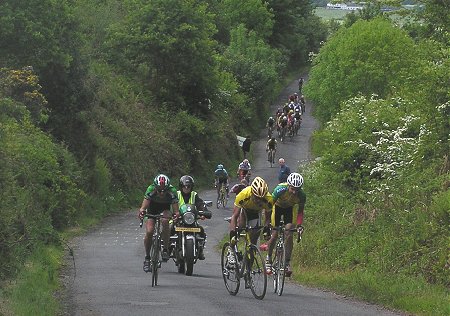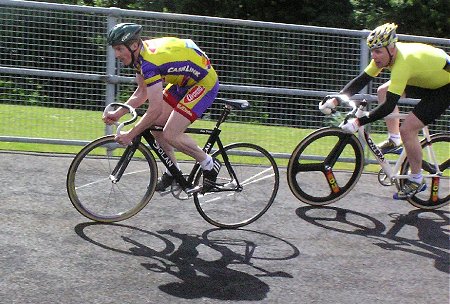
|
 |
|
Last Updated: 19 Jul 2021 - 7:26:24 PM |
THE FOUNDATIONS FOR SUCCESS IN 2005 BEGINS NOW
By Paddy Doran, Level 3 Coach
3 Nov 2004,
|
Email this article
|
Especially for second - third category and junior riders
This article is written for part time junior and senior riders (male and female) who intend to participate in the Domestic cycling programme. Full time senior international riders will have different needs depending on when their season begins and what races they must peak for. For example Tour Down Dnder riders and Tour of Langkawi riders will have to train more specifically to be in good enough condition for these early season races.
It is designed to build on fitness gained from the hard work you have carried out during the 2004-racing season and to assist you in moving to another level for 2005
It is a general approach to how you might approach training. I cannot be more specific as each individual differs in his or her training needs and the amount of time they have available to train. And an assessment is required when developing individual plans
PREPARATION PERIOD ONE NOV - DEC, BUILDING A BASE
This is the first part of the most important training period time of your season.
Performance expectations during the racing season are determined by the training carried out during this stage of the preparation period. Too little of an increase in the amount of training or over training, during this period will result in a lower standard of fitness, instability of performance, and inability to train to peak performance for important events.
This is the base on which your season will be built, how your body copes with hard training and racing at later stages of the season ultimately depends on the amount and quality of training during this period.
The aims of the first stage of the preparation period is to build up your reserves, or tolerance to the training loads, particularly to meet the very intensive demands of the PRE COMPETITIVE and COMPETIVE periods. This is achieved by substantially increasing the amount/volume of training, because of the large increase in the volume of training the intensity must not be too high or over training will occur. So training must be well planned and controlled. A high percentage of this training period is usually general training [other sports running gym work etc]
NO SHORTCUTS:
If the volume of training is too low during this period performance in races during the 2005 season will be inconsistent, and you will not be able to reach peak performance. It is highly likely that your fitness will actually deteriorate when you begin intensive training /racing as you will not have the reserves to cope with the higher loads.
AIMS OF THIS PERIOD:
 |
| PHOTO OF RAS ON SESKIN HILL WITH PAUL GRIFFIN & DAVID MC CANN UP FRONT |
 |
| TRACK SPRINT WITH PETER DUNNE KEITH BANNON |
INCREASE:
The early part of this period is a continuation of the transition period, and gradually increases general activity Jogging - gym - swimming weight training etc with some cycling at weekends The cycling ideally would be a mixture of road and off road, even cyclo-cross if you do not have a mountain bike or mountains near to where you live.
ENJOYMENT AND VARIETY:
This time of the year gives you a great opportunity to try other sports, which you may like but cannot do during the racing season.
The activities you take part in must be approached in a relaxed manner, They should be satisfying to you, or the big danger is that you will be bored with training when you should be really enthusiastic about it.
Vary training as much as possible. The ideal would be a mixture of, Running, Hill walking Swimming, Mountain Biking, Cyclo Cross and Road Cycling, Indoor Ball Games, Weight or circuit training, this will develop a high level of all round fitness.
EMPHASIS:
The main emphasis in the early stages is on general preparation, (gym, running, circuit training etc). This gradually changes to having more emphasis on specific training (cycling), so that by the end of December, on the bike training occupies a large extent of the training time. [This obviously depends on lifestyle, time available, hours of darkness etc]
INTENSITY:
There should be a reasonable amount of training during this period. However the overall intensity of training is low compared to when you are preparing for race fitness, from mid Feb on.
AEROBIC CONDITIONING:
Always bear in mind that endurance cycling competition is a highly aerobic activity, so aerobic activities should form the bulk of your training programme. Aerobic conditioning exercises should be the priority, during this stage.
HOW OFTEN MUST YOU TRAIN:
There should be at least three training sessions per week if a good level of aerobic fitness is to be maintained. To improve strength requires two to three strength training sessions per week.
Four to five days training is usually possible for a rider who must work or attend school or college. I believe that more than five days per week is counterproductive for a part time rider.
Cycling should be carried out at weekend�s gym � jogging etc could be carried out midweek. If unable to cycle because of weather conditions at weekends visit the gym or jog swim etc. Or you could use a combination of turbo training and some other form of training.
The total amount of weekly training that you progress to during this period can vary from seven to twelve hours. According to time available for training and rest and your goals.
SAFETY PRECAUTIONS:
For running or cycling at night wear reflectors, and light up your bicycle, train in well lit areas. Always wear your crash hat. Cycling on dark roads is extremely dangerous and to be avoided where possible. For weight or circuit training ensure your instructor is qualified. If jogging, particularly on the road, good quality running shoes should be worn to avoid injury. Wear clothes suitable to the weather conditions.
TIPS:
If you have not already done so, organise a physiological medical test and blood tests by a sports medicine / science specialist. This will give you base information and ensure that you are benefiting from your training.
Be very progressive. Ten per cent per week is the maximum amount that you should increase the training by.
Do some work on having your bicycle position set up correctly (if required)
If you had any ongoing muscular skeletal problems (knee / back problems etc) during the season make an appointment with a chartered physiotherapist for an assessment and remedial treatment to eliminate the problem for next season
|
|
 |

|